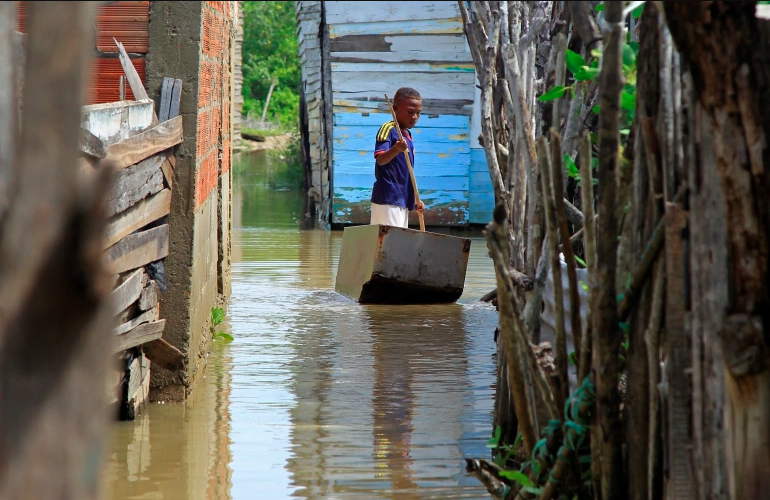Updates & Press
Featured | November 20, 2020
Weekly Humanitarian News Digest – November 2
Author | MedGlobalComms

Each week, we highlight the latest news related to the humanitarian and health crises in our countries of operation: Bangladesh/ Myanmar, Colombia/ Venezuela, Ecuador, Gaza/ Palestinan Territories, Greece, Lebanon, Pakistan, Sudan, Syria, and Yemen. We also highlight the latest official COVID-19 figures in each of these countries. For more frequent updates, make sure to follow us on Facebook, Instagram, and Twitter.
Cover Photo: Al Jazeera/Ricardo Maldonado Rozo/EPA-EFE
Latest News for November 13 – November 20, 2020
* COVID-19 statistics, unless otherwise indicated, are from the World Health Organization and current as of November 20.
Bangladesh/ Myanmar
Official COVID-19 Stats:
Bangladesh: 441,159 confirmed cases, 6,305 deaths.
Myanmar: 74,882 confirmed cases, 1,676 deaths.
The government of Bangladesh announced that it will reunite the 306 Rohingya refugees kept on Bhashan Char, a flood-prone island, with their families in Cox’s Bazar. The decision to move the refugees follows months of condemnation from humanitarian organizations over the detainment of the refugees against their will and allegations of abuse and poor living conditions. Bangladeshi authorities insist that the facilities on Bhashan Char are suitable for habitation and plan to follow through with relocating 100,000 Rohingya refugees to the island from Cox’s Bazar. (Radio Free Asia)
Colombia/ Venezuela
Official COVID-19 Stats:
Colombia: 1,218,003 confirmed cases, 34,563 deaths.
Venezuela: 98,350 confirmed cases, 860 deaths.
Hurricane Iota, the first category five hurricane to hit Colombia, has damaged 98% of infrastructure on Colombia’s island of Providencia and killed at least one person. Damaged communications infrastructure and dangerous weather conditions have isolated the island, hindering a full assessment of the damage as well as the delivery of humanitarian aid. (Aljazeera)
Gaza/ Palestinian Territories
Official COVID-19 Stats: 79,822 confirmed cases, 676 deaths.
According to the UN’s Special Coordinator for the Middle East Peace Process, Nickolay Mladenov, Gaza is ill-equipped to deal with a major spike in COVID-19 cases. Mladenov cited Gaza’s crippled health system, weak infrastructure, poor living conditions as causes for concern. An estimated 40% of Palestinian households have lost more than half their income during the pandemic and many are facing food insecurity. Mladenov specifically noted that women and children in the occupied Palestinian territories are disproportionately impacted by the effects of COVID-19. (Middle East Monitor)
Greece
Official COVID-19 Stats: 82,034 confirmed cases, 1,288 deaths.
Greece plans to build new camps for asylum seekers and reduce the maximum length of stay in its overcrowded camps. The country currently hosts over 90,000 migrants, 19,000 of whom reside in camps with poor living conditions. The new camps are expected to be completed by fall of 2021 and asylum seekers will no longer be kept on the islands for more than six months. (Reuters)
Tens of thousands of refugees have been quarantined indefinitely in Greece’s island camps where they are unable to social distance and lack access to masks. Lockdowns of camps continued during the summer, despite the fact that most camps had no positive cases and Greece opened up for tourism. Restrictions have disrupted access to social services, legal aid, and child education. (VICE)
Lebanon
Official COVID-19 Stats: 111,946 confirmed cases, 868 deaths.
Following a rise in COVID-19 cases, Lebanon entered a lockdown on Saturday that will continue until the end of November. During the month of October, 42,000 people contracted COVID-19 in Lebanon, 277 died, and hospital ICU beds reached 80% capacity. Despite the health crisis, many Lebanese are unable to comply with lockdown measures due to the ongoing economic crisis that has led to 55% of the population living in poverty, double compared to last year. (Deutsche Welle)
Pakistan
Official COVID-19 Stats: 365,927 confirmed cases, 7,248 deaths.
Pakistan is experiencing its highest spike in COVID-19 cases since July with new daily cases rising above 2,000. On Sunday, the percentage of tests that were positive was 7%, more than double the rate over the last four months. Pakistan responded by banning public gatherings out of concern that hospitals will be overwhelmed with cases. (Reuters)
Sudan
Official COVID-19 Stats: 15,299 confirmed cases, 1,179 deaths.
Over 27,000 Ethiopian refugees have crossed into Sudan, fleeing violence in Ethiopia’s Tigray region. Humanitarian organizations, including UNHCR and the World Food Programme, are responding to the crisis by delivering aid, but conditions are expected to worsen as more refugees arrive. (Radio Dabanga)
Sudan’s Ministry of Health recorded 319 new cases of COVID-19 over the weekend and 59 people died from the virus in a two-day period. Ministry of Health officials have cautioned that the government may implement a new lockdown due to poor adherence to health guidelines among the general population and limited testing capacity. (Radio Dabanga)
Syria
Official COVID-19 Stats: 6,991 confirmed cases, 363 deaths.
The number of COVID-19 cases in Northwest Syria has reached 10,633, with 89 confirmed deaths and 400 new cases recorded daily. In Idlib governorate, half the population lives in temporary shelters with limited access to running water and are unable to social distance. The area has 15 quarantine centers for mild cases and five hospitals, equipped with only 80 ventilators, for severe COVID-19 cases. (Middle East Eye)
Yemen
Official COVID-19 Stats: 2,072 confirmed cases, 605 deaths.
The UN and international relief organizations are removing American staff from northern Yemen in anticipation of the United States designating Ansar Allah a foreign terrorist organization. The capital city of Sana’a and the majority of Yemen’s population live in areas currently under the control of Ansar Allah. The designation is expected to hinder humanitarian response efforts and lead to greater food insecurity as the country faces famine. (Foreign Policy)


